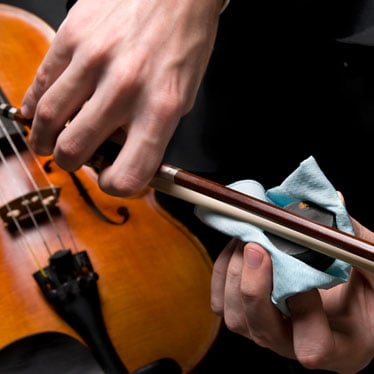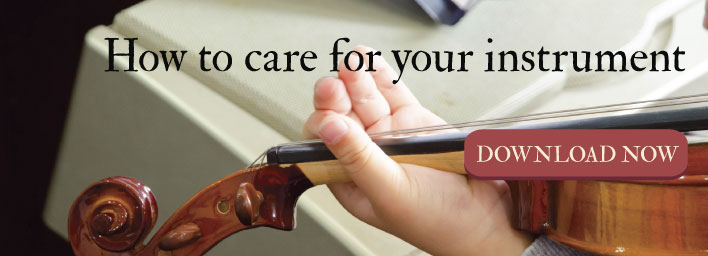What Is Rosin And How To Choose The Best One For Your Bow

Rosin is a catalyst between your bow and your string instrument, creating the friction required for the bow’s sleek horsehairs to grab the strings. When you use the right type of rosin and apply it correctly, the added friction vibrates the strings, producing a rich, even tone.
Without any rosin, a bow hardly elicits any sound from the strings, just a faint whisper, and the bow slips inconsistently over the strings. Applying too much rosin results in scratchy and harsh tones, and the bow feels stickier on the strings, requiring more bowing effort on your part.
Thus, string players must learn the differences between various rosins so they can choose the best one for their bow, their instrument, and their desired sound quality.
What Is Rosin and How Is It Made?
Rosin is made from resinous sap from coniferous trees. The majority of the rosin sold here in the United States is made from the same pine trees used to make paper pulp. You can Click Here to read a detailed description of how rosin is made. Ultimately, sap from coniferous trees is boiled, filtered and refined.
Some rosin manufacturers, like Magic Rosin, are purists and prefer to keep their rosin cakes free of additives. Other brands intentionally mix their base resin with additional ingredients (typically wax, chemicals or even metal particles), which are added to achieve the desired consistency and friction level.
Once the alchemy is complete, cooled, liquefied rosin is poured into molds while it’s still malleable. When it dries and hardens to the desired consistency the rosin cakes are packaged up and shipped off for sale.
Why Are There So Many Different Colors and Textures?
There multiple factors that affect a string player’s rosin preference. The most common considerations are:
The instrument you play
Typically, lighter, more amber-hued rosin cakes are lighter in density, drier and less sticky to the touch. These are the rosins most often used by violinists and violists.
On the other side of the spectrum are medium-hued rosins, which tend to be slightly softer, and tackier to the touch, and darker rosins that are the softest and stickiest of all. Medium- and darker-hued rosins create more friction between the bow hairs and strings and are geared for cellists and bass players, respectively.
The type of strings you use
The type of strings you play can affect rosin selection. While steel- and metal core strings are best served by harder and drier rosins, gut- and synthetic core strings sound best with a softer resin.
The good news here is that beginning string musicians can always start with the rosin type recommended by their strings’ manufacturer, and experiment with other rosin types or brands over time and with experience.
Personal instrument and sound preference
As your musicianship evolves, and you have the opportunity to practice playing on different instruments, you’ll learn what a variation there can be within the same group of instruments.
You may find that even though you’re using a drier rosin made for the viola, your instrument’s structural design yields hollower sound than you like. In that case, you might experiment with a slightly softer rosin, or one with metallic additives (known for increasing friction across the strings), to yield deeper and richer tones.
Additional Considerations and Tips When Choosing Rosin
Other things to consider when choosing rosin:
- Proper rosin application is key to its function. Don’t blame your rosin unless your instructor has observed your rosin ritual and agrees that a different type of rosin may improve things.
- Beginners often benefit from darker rosins (within their instrument/string recommendations) to help with grip until they develop better bowing skills.
- Rosin cakes last a long time, so it’s worth spending $20 to $40 for a higher-quality rosin that helps you produce a richer sound.
- Temperature and humidity also affect rosin texture/consistency. Those who live in more extreme climates may use different rosins in different seasons.
Ultimately, it will take a bit of experimentation to determine which rosin type is best for your instrument and bow. We recommend starting with Magic Rosin. In addition to being 100% natural and free from additives, their products also come in a range of fun styles and themes.


